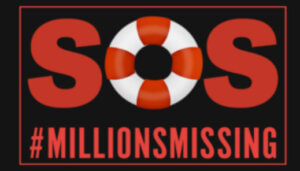Listen to the audio version recorded by Anna Ruddock @annalouruddock
Cindy Downey wrote this editorial as a response to the opinion piece, “The Emotional Toll of Not Being Heard,” published by Christina Baltais. Artwork by Cindy Downey.
Thank you, Christina, for your eloquent comments about the emotional toll from the wall of stigma that surrounds ME. Thank you so very much for your courage in telling your story. Your articulation of social problems encountered by PWME (people with Myalgic Encephalomyelitis) struck a chord. You have described so many important and relevant points that we have all encountered, and I want to comment on a few of them:
1) Medical professionals, the public and the media don’t apply logic to their view of ME. People with other very serious illnesses don’t look sick either. And yet, many expect to be convinced PWME are sick by the way they look. My first encounter with this bit of illogic – and connecting the dots – was when I saw a woman with cancer who was tanned and chipper having just come back from a lovely vacation, and she looked great – not sick at all; but she had cancer. If people with ME are pleasant, seem happy, alert, and look good, others wonder if we’re really sick. It seems others expect those who are seriously ill to be depressed, downcast, completely bedridden 24/7, looking wrung out etc. However, there are millions upon millions of people with serious illnesses who don’t look sick. They look happy, and they laugh. But, because they have an illness that is accepted, with a serious sounding name e.g. diabetes, or MS etc., and they receive effective, or at least meaningful treatment, they don’t face the stigma and cruel disbelief PWME do. People in general, support them.
2) Society is very short-sighted about ME. Repeatedly, other illnesses thought to be psychological have eventually been found to be physical. Illnesses we incarcerated sufferers for; tried to counsel and sedate away; ridicule people for etc. It doesn’t seem many people see a pattern, the bigger picture. Forty years ago, asthma and certain forms of arthritis were still seen as psychosomatic. Now, we would laugh at such primitive beliefs.
3) Just because PWME may be able to muster a bit of scarce energy to go out and about to see their doctor, or entertain friends and family at home, people have the impression PWME are always able to do this. They don’t know, or understand the costs involved. And, perhaps we don’t tell them. Who wants to tell their dinner guests that because of the effort put in to entertain, tomorrow – and maybe for several days to follow – we will likely crash, have an increase in post-exertional malaise. But when we do tell others what costs we will have to pay, they don’t believe us. This is the focal point, the very crux of ME – with exertion comes post-exertional malaise. A very true, but very difficult concept for non-PWME to understand. (Post–exertional malaise (PEM) is a worsening of many ME/CFS symptoms as a result of physical or mental exertion.)
4) To have ME, and be disbelieved “adds another layer of suffering”. You are so right, Christina! ME shatters lives, families, friendships, and social bonds in general. It colours many encounters with the medical professions, not only about ME, but, perhaps, all aspects of one’s health. For example, if you have a toothache and your dentist can’t see anything wrong on an X-ray, it’s because, “You people are more sensitive to every little ache and pain.” Friendships of decades are lost because of the poisonous misinformation surrounding ME – the respect and level playing field in friendships can quickly disappear with a Chronic Fatigue Syndrome* diagnosis. Family members, thinking they are being well-intentioned and providing sound advice are critical, unfeeling, uninformed and cruel, no matter how much information we try to give them. *(ME is also often called Chronic Fatigue Syndrome or ME/CFS.)

5) History is full of stories about groups denigrated by others for various reasons – money, power etc. And the ME community is one of them. Those intelligent enough to look beyond the poisonous lies to the real story will see that ME is a very serious, life shattering disease, deserving of respect, commensurate research funding, medical training, and effective treatments.
Thank you very much for promoting the Unrest impact campaign, Christina. With this wonderful documentary, the ME community hopes that many more will look beyond the harmful myths about ME to the real story underneath. To this end:
Unrest is coming to Kelowna, BC.
The University of British Columbia Okanagan (UBCO) Disability Resource Centre, is hosting a screening of Unrest: Oct. 3rd, 5:30pm, at the University Centre Building Room 106, 3272 University Way. The theatre seats 80. Tickets are $10. A donor has purchased 10 tickets for medical students. T
hose interested may contact the UBCO Disability Resource Centre directly – drc.questions@ubc.ca Phone 250-807-9203. Tickets may be purchased online: https://cbm.ok.ubc.ca/drc/unrest/registration.php UBCO Disability Resource Centre website: http://students.ok.ubc.ca/drc/welcome.html
Thank you, again, Christina for your words. You have described our lives, and ME experiences so very well. We hope for a better, kinder, more enlightened future for PWME very soon.

SOS: Save our Science
People disabled by ME and Long Covid across the UK send out an SOS. It’s time to send out our SOS signal, if we want to have funded research. May 12th, is Myalgic Encephalomyelitis Awareness Day. On this day, the #MillionsMissing of people with myalgic encephalomyelitis (ME) gather to demand an increase in research and



